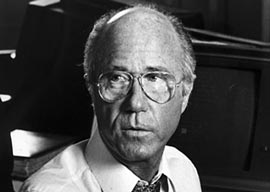
February 21, 2015

Arnaud de Borchgrave
I hate to start with a cliché, but Count Arnaud de Borchgrave d’Altena, who died in Washington, D.C., last week aged 88, was the last of the great foreign correspondents, with trench coat, suntan, title, and 17 wars under his belt included.
One accomplishment none of his obituaries comprised—mind you, this is perfectly understandable—was the introduction to journalism and subsequent mentoring of the greatest Greek writer since Homer, yours truly, a fact Arnaud kept quiet about throughout our 48-year-close friendship. Here’s how it began:
It was May 1967. The Greek junta had just taken over the government in April, and Arnaud had flown in to interview the Greek strongman, Colonel Georgios Papadopoulos. A Greek mystery man, Niko Farmakis, who may or may not have been a CIA agent or a Greek secret service man, or even just a well connected enabler, had invited me to dinner at the Starlight Roof of the Hilton Hotel. “You’ll meet the greatest foreign correspondent ever,” he told me.
My beautiful first wife was the only lady present at the dinner. Arnaud was suntanned, well dressed, and spoke beautiful French and English. He looked far more elegant than most people in the room, with the exception of the reigning King Constantine, dining near us with the pregnant Queen Anne-Marie. Arnaud held court, regaling us with stories about the wars in Indochina and Algeria, including the siege of Dien Bien Phu, one he had covered with distinction. I was going nuts throughout. My tennis career was a flop, I was not happy being married to the prettiest girl in Paris, my father was threatening to cut me off unless I went to work for him, and the future looked bleak for a poor little Greek boy who had just turned 30.
Three days later, very early in the morning, I drove to the airport, bought a ticket to Rome, and sat next to Arnaud, flying first class, naturally. I told him I only had a toothbrush and was heading for Turin to see Gianni Agnelli of Fiat fame. He asked for an introduction and I guaranteed him one. We then connected with a flight to Torino. Two weeks later, Gianni’s handsome face was on the cover of Newsweek, Arnaud had convinced the editor of the weekly that I could open doors galore, and I had been given a Newsweek press credential as a photographer. The rest, as they say, is non-history.
Arnaud covered the Six-Day War wearing an Israeli army uniform, and the Yom Kippur one wearing an Egyptian general’s outfit. He got exclusives galore in between, interviewing Nasser and Golda Meir in the same week; Sadat, Rabin, Gaddafi, you name them, he got to them. That’s about the time he met and married his third wife, Alexandra Villard, the love of his life who became his widow. Two guesses as to who made the introductions.
One time, while ensconced in the Cairo Hilton waiting for him to see Sadat, Arnaud lost his temper with me as I lay in bed all day reading my books on Napoleon. He was a very early riser and made me jittery with his energy to always be doing something. “Go out and take some pictures,” he ordered. I did and soon had an Egyptian mob after me, as anyone taking pics back then was seen as an Israeli spy. After a couple of hours in an Egyptian jail cell I returned, bloody but unbowed, to the Hilton. “You mean you got no pictures?” asked a demanding-as-ever boss.